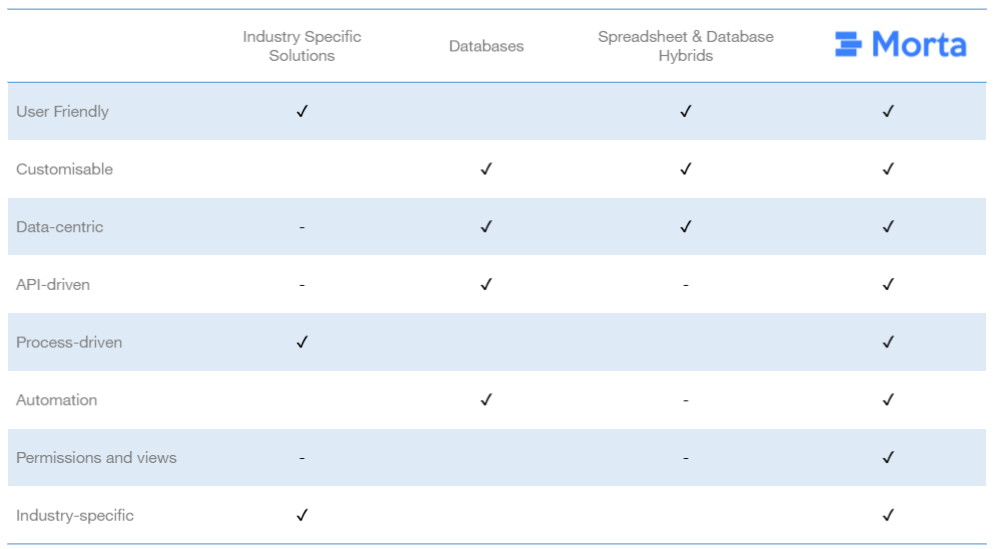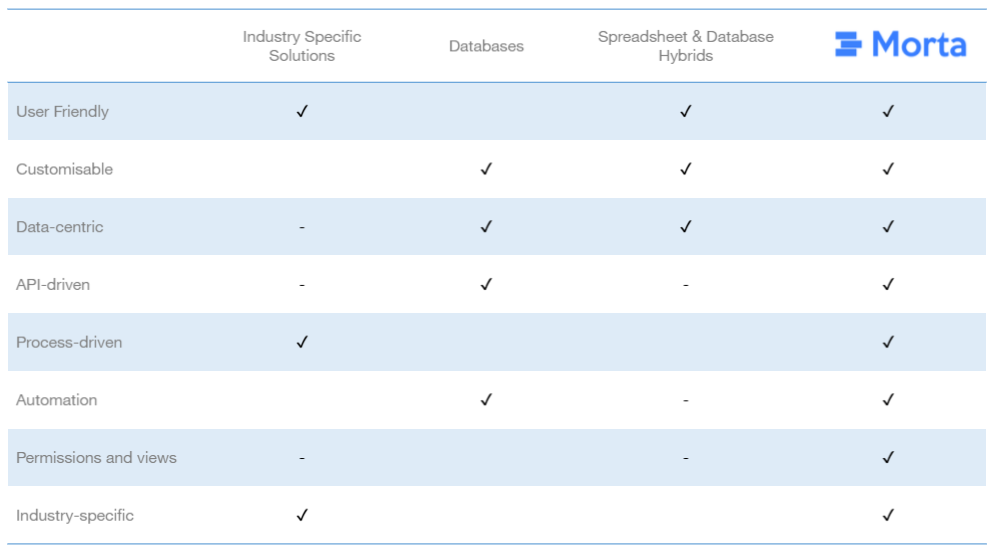Alternatives to Spreadsheets in Construction and Asset management

In our last post, we noted that spreadsheets are commonly used in construction to collect, store, reconcile and analyse information. Whether it is a cost plan, responsibility matrix, or information requirement, organisations will typically use spreadsheets.
However, we noted that databases are better than spreadsheets because they improve data integrity, consistency, quality, re-use, accessibility, security, and connectivity. Many of you then asked us, if not spreadsheets, then what? What solutions can you use in construction to respond to these problems and get the advantages of databases?
In this post, we cover the three conventional alternatives you can use to get you out of spreadsheets: dedicated industry-specific solutions, traditional databases, and no-code solutions.
Alternative #1 - Dedicated Industry-Specific solutions (e.g. Procore, Rhumbix, CMIC, CostX, dRofus, variations of Microsoft Dynamics)
These are conventional solutions that take on specific construction workflows and provide you with a solution to manage these processes. The main advantage of these solutions is that they have typically provide you with "best practices" for a specific process
However, these advantages can quickly be their achilles heel: what if you want to modify a workflow to meet your precise needs as an organisation? Your clients' needs? Add a specific classification code? Another approver? Or use them in a vertical they haven't been used for (e.g. many solutions are suitable for small projects but cannot be used in large projects or vice versa). Organisations then quickly have to go back to excel or have to pay a fortune for their customisation!
Alternative #2 - Databases (Microsoft Access, SQL Server)
These are the conventional databases you may be familiar with. They are typically highly customisable, extensible and enable organisations to create the applications of their choice.
However, in our experience, we have found that these solutions typically need technical expertise and high investment from the organisation's side. Moreover, they tend to lack interfaces that are suitable for collaboration and widespread adoption. In the case of Microsoft Access, getting it to work across multiple parties in a cloud-based environment is a herculean task.
Alternative #3 - Spreadsheet & Database Hybrids (Examples: Airtable, Smartsheets, Notion, Coda)
This is an emerging category in the industry. Organisations are beginning to consider using user-friendly solutions that have interfaces comparable to spreadsheets and databases' utility. They are appreciated (some would say loved) by non-technical business professionals who use them to build databases of their own.
We are big fans of how many of these solutions work and have learnt a lot from them. However, while these solutions are beginning to show the promise of databases in construction, they lack in some respects:
- They are industry agnostic solutions. While this may appear as an advantage, the amount of work required to take them to the level of dedicated solutions is tremendous.
- They often lack integrations to software used in construction.
- They are designed for much simpler industries and use cases (e.g. using Airtable as Morta's CRM is excellent, but using it to manage payments from 50+ parties would be challenging).
- Their business models are not in line with how the industry operates.
A new Alternative: Morta
In many ways, Morta is a spreadsheet/database hybrid like the above. However, Morta is fully committed to construction, assets and project management. Our product was built by a team that has a mix of ex-construction professionals and technologists alike. As a result, we bring the advantages that the emerging no-code solutions have (e.g. customizability, user-friendliness) with the benefits of dedicated solutions (e.g. best practices for workflows, integrations). Here are eight ways Morta stands out:
1) User-friendly interface: Whether you are a technical python guru or a professional working on-site, Morta's interface will feel familiar and intuitive. Crucially, Morta's end-users can interact with document-like interfaces rather than intimidating tables
2) Customisable: You can customise processes and tables to meet your precise needs, regardless of the size and type of the project or process.
3) Data-centric: You can collect data, verify the quality of data, and analyse data. Our focus on data has resulted in specific features such as defining data types, in-cell validation and handling huge data sets.
4) API-driven: We believe in a future where you can pull and push the data you need from any system. Morta users can easily bring together disparate data sets (in one of our projects, we are bringing together 150+ data sets that include field, material, progress and accounting datasets)
5) Process-driven: Morta provides you with the capability to build and interact with processes made up of tasks and activities. Examples of this include submittal management, implementing ISO 19650, or payment application verification.
6) Automation: Morta understands that project teams currently have to complete manual tasks that range from notifying someone by e-mail to reconciling costs and verifying deliverables. You can enable users to automate everyday workflows to focus on tasks that can move the needle.
7) Permissions and views: You can control who can view, submit, review and approve data. This allows us to have 60+ companies working on the same data sets in real-time without worrying that they can each view each other's data.
8) Industry-specific processes: Unlike generic no-code solutions, Morta provides you use-cases that meet your precise needs. This means offering you far more than 'project trackers' to include requests for information, exchange information requirements, and change order requests.

Some people will read the above and think, so am I meant to transfer all my processes to Morta? The answer is no. Morta aims to help you fill the gap where you don't have dedicated solutions. So, if you work in construction, project management or asset management and are looking for a solution that can help you improve your data quality, connect your data and automate your processes, feel free to reach out or book a call to discuss your challenges here.
.png?width=5836&height=1234&name=logo%20(1).png)